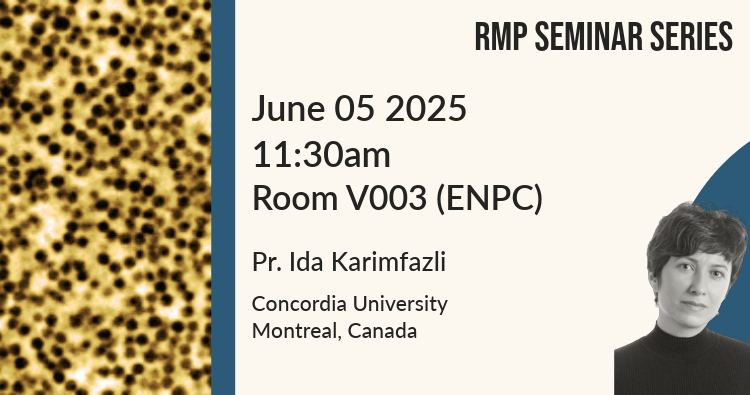
Séminaire RMP: Pr. Ida Karimfazli (Concordia University, Canada)
Stirred but Not Mixed: Localization and Transport in Yield-Stress Fluids
Abstract:
Mixing processes play a fundamental role in numerous natural and industrial systems, impacting applications ranging from environmental fluid dynamics to chemical processing and pharmaceutical manufacturing. Mixing in yield-stress fluids is often assumed to be inefficient, but the underlying reasons remain poorly understood. In this talk, I explore how yield stress and fluid heterogeneity influence flow and shape mixing behavior. Using a combination of numerical simulations and physical insight, I show that even small variations in density or rheology can significantly impact mixing outcomes. I highlight three primary mixing mechanisms (interface stretching and folding, diffusion across streamlines, and dye advection) and demonstrate how the presence of a yield stress transforms these dynamics, leading to pronounced localization. These findings challenge conventional assumptions about mixing efficiency in complex fluids and suggest new strategies for analyzing and designing more effective stirring protocols in yield-stress materials.
Bio:
Dr. Ida Karimfazli is an Associate Professor in the Department of Mechanical, Industrial, and Aerospace Engineering at Concordia University in Montreal, Canada. She holds a Ph.D. in Mechanical Engineering from the University of British Columbia and an M.Sc. from Stanford University. Her research focuses on complex fluids, with particular emphasis on mixing, flow localization, and transport phenomena in non-Newtonian fluids.
Dr. Karimfazli leads a research team that conducts a wide range of computational and experimental investigations into complex fluid dynamics. The overarching goal of her research program is to reduce the environmental footprint of the energy sector. Much of her work is motivated by the role of complex fluids in developing clean technologies and advancing renewable energy solutions. Her contributions have been disseminated in over 50 publications. Her group’s projects are highly interdisciplinary, drawing on rheology, fluid mechanics, and materials science, and frequently involve both academic and industrial collaborators.


